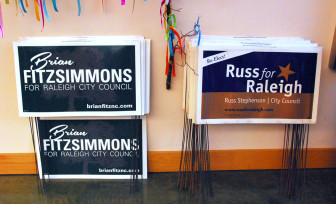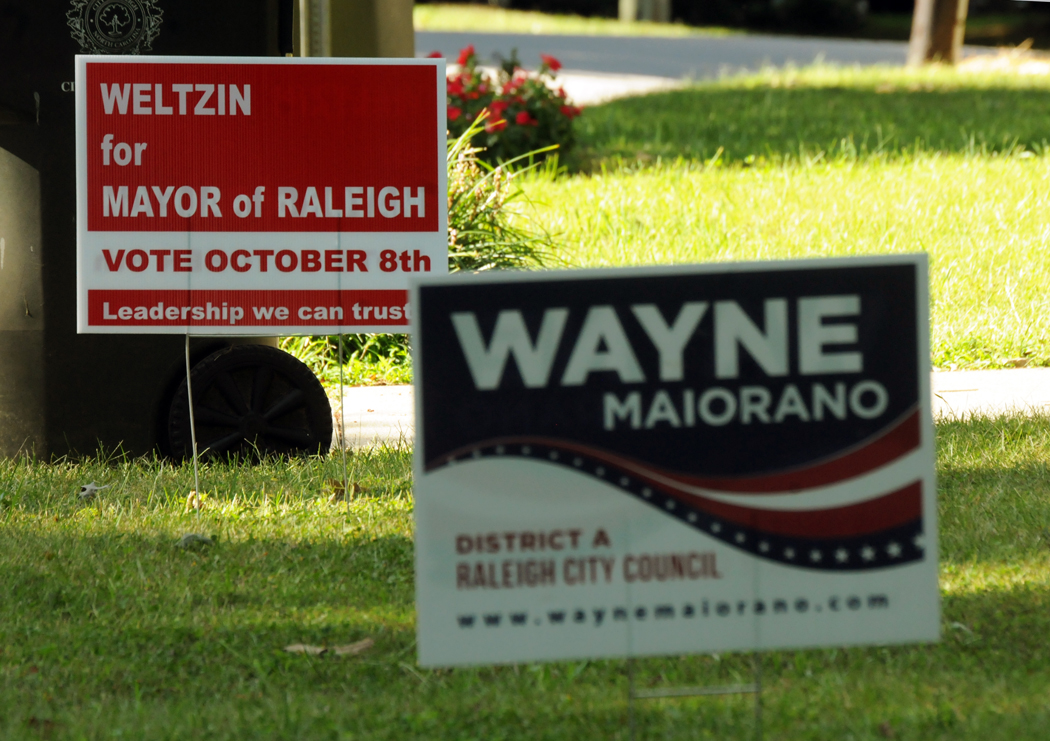Candidates for the 2013 Raleigh city council and Wake county school board elections have raised more than $440,000 through the end of September, county finance records show.
Although there is a large disparity in the amount raised by individual candidates — incumbent Mayoral candidate Nancy McFarlane has raised the most at $148,218 and city council District C challenger Marcus Hill has raised the least at $138, all of it self-funded — the numbers dwarf in comparison to the kind of money at play in state and national elections.
Senator Kay Hagan, for example, raised $10,886,424 in her successful 2012 bid for the U.S. Senate, and President Pro Tempore of the North Carolina State Senate Phil Berger raised $1,578,139 in his successful 2012 re-election campaign.
Voter interest in local, off-year elections is also significantly lower; Wake County saw a 21 percent voter turnout in 2011, compared to 74 percent in 2012.
“Local politics tend to be less ideological, they tend to be more about practical concerns,” said Andrew Taylor, a political science professor at N.C. State University.
“They are less about issues that people really care about, that drive them into public life; being for or against same-sex marriage or abortion, thinking about the direction that the country should go in, the size of government – these aren’t the things that drive local politics,” he said.
In local elections, “You’re not likely to see a television ad for a candidate,” said Brent Laurenz, the executive director for the N.C. Center for Voter Education.
“A lot of it is going to be done with mailers, and you see a lot of yard signs and a lot of door-to-door contact from the candidates,” he said. “The money is used differently, but it can still be impactful and influential. If one candidate were to somehow outraise another tremendously, it would be a real advantage in these lower-dollar races.”
Money Talks
The amount of money raised by the candidates naturally affects the ways in which that money can be spent. Mayor McFarlane, for example, spent more than twice the combined total raised by her challengers, $2,064, on catering an event held this past summer, according to county record.
Robert Weltzin, who is running against her, has raised a total of $350, according to campaign finance records, while Venita Peyton reported that she raised just less than $500. Peyton’s only reported expenses to date outside of the $100 candidate registration fee include $99 for stamps, envelopes, cards, paper and ink and $9.23 for a set of checks.
Wayne Maiorano, who is running against incumbent Randy Stagner in the heated City Council Distract A race, has raised the second-highest amount among all the candidates with a total of $72,680. Stagner reported that he has raised $38,225 – more than the $21,362 he had brought in by this point for his successful 2011 bid for the seat, although $20,000 of this year’s funding comes from money Stagner himself loaned the campaign.
Maiorano’s fundraising efforts have enabled him to invest a significant amount in traditional local electioneering expenses – more than $20,00 was spent on direct mailers – along with a few things most other candidates simply could not afford, such as an $800 photo shoot.
Hill, the aforementioned District C candidate, has put his $138 toward more pragmatic purposes – $100 went towards the candidate registration fee, and the remaining $38 was spent on his web site. The incumbent, Eugene Weeks, has raised a total of $1,305 and the other challenger, Raquel Williams, has raised $633.
Don McIntyre, who is running in District 1 for the Wake county school board, has raised a total of $4,333 to his opponent Tom Benton’s $7,391, and most of his disbursements to date have been for the kinds of expenses Laurenz cited: $5.34 for thank-you notes, $400 for door hangars, $1,490 for yard signs.
“Yard signs are one of those weird things where I feel like every candidate has to have them but nobody really knows what they do or what value they serve,” Laurenz said. “In these local elections though, that might be the only way you see these candidates’ names, is if you’re parked at a stoplight and you look over and there’s a yard sign for a mayoral candidate.”
Professor Taylor stressed the importance that this type of awareness can play in smaller elections.

Karen Tam / Raleigh Public Record
“Since we don’t have partisan elections, there’s no ‘R’ or ‘D’ after a name to provide a voter with a cue, so the recognition of a name is important in that regard,” he said.
In addition to raising awareness about their own candidacies, Taylor said local politicians also have to spend their time and money on raising awareness about the election itself.
“It’s already hard enough to get people to pay attention, and get voters to come out and vote, so anything candidates can do to really break through the clutter and communicate,” he said. “I mean that’s really what it really comes down to, is to communicate with voters at some point to even let them know there’s an election here in Raleigh.”
All Politics is Local
Both Taylor and Laurenz expressed frustration with the paltry turnout rates for local elections.
While Taylor understands that people don’t get as passionate about issues such as transportation bonds or property development as they do about the ones which often drive national elections, he said there are a variety of reasons why people should pay more attention to local elections.
“There are principles of free speech and the importance of being involved in civic life on any side of an issue,” he said.
“Often these kinds of things are wrapped in, you know, neighborhood residents versus developers; that’s not necessarily the case. Development can often be very good, it’s a question of being involved and trying to understand issues and think about them that’s important.”
Laurenz agreed.
“I mean if you’re talking the races and elected officials that can have a real impact on your day to day life; look at the City Council and School Board races,” he said. “The president doesn’t have a lot of impact on your traffic patterns and how long you’re going to get stuck in traffic due to some traffic problem that City Council could address.”
The Almighty Dollar
Ultimately though, whatever the voter turnout for 2013 ends up being – “If we have 15 percent this year, it might be impressive,” Laurenz speculated – the role that money ends up playing in the elections will be a significant one.
In addition to helping their preferred candidates win elections, donors at the local level may also believe that because their money makes up a greater percentage of a candidate’s total funding, it entitles them to have a greater level of access and influence than they may be able to gain by donating to a state or national candidate.
Taylor said there are three types of giving at the local level.
“There’s giving because you know the person running, there’s giving because as a good Democrat or a good Republican you just give to people like that, and then there’s the giving that is done because you are directly trying to have some influence; you have in mind a specific decision that is going to come in front of [that candidate].”
While he said he can’t get inside the motivations of the donor’s heads, Taylor did describe this third type of giving as “problematic.”
Regardless of why they may be receiving it, candidates will always be receptive to any sort of donation; without money, their chance of winning an election at even the local level is severely diminished.
“You need money to run campaigns, unfortunately,” Laurenz said. “That’s kind of he way it works – if you want to communicate with voters you’re going to have to spend money to do it.”
